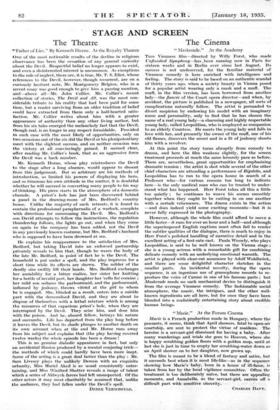STAGE AND SCREEN The Theatre
*`Father of Lies." By Kenneth Home. At the Royalty Theatre ONE of the most noticeable results of the decline in religious observance has been the cessation -of any general curiosity about the Devil. Respectful belief no longer appears to exist, and even a disinterested interest is uncommon. As exceptions to the rule of neglect, there are, it is true, Mr. T. S. Eliot, whose references to the Devil, however, though recurrent, are on a curiously hesitant note, Mr. Montgomery Belgion, who in a recent essay was good enough to give him a passing mention, and—above all—Mr. John Collier. Mr. Collier's recent collection of stories, The Devil and All, was the most con- siderable tribute to his reality that had been paid for some time, but a reader surviving from an older tradition of belief could have extracted from them only a half-hearted satis- faction. Mr. Collier writes about him with a greater appearance of authority than any other living author, but from his six tales emerged the melancholy fact that the Devil, though real, is no longer in any respect formidable. Provided in each case with the most likely of opportunities, only on two occasions out of the six did the Devil or his plenipotentiary meet with the slightest success, and on neither occasion was the victory at all convincingly gained. It seemed clear, after reading Mr. Collier's book, that as an aggressive force the Devil was a back number.
Mr. Kenneth Horne, whose play reintroduces the Devil to the stage after a long absence, would appear to dissent from this judgement. But so arbitrary are his methods of introduction, so limited his powers of displaying his hero, and so timorous his own attitude in the matter, it is doubtful whether he will succeed in converting many people to his way of thinking. His piece starts in the atmosphere of a domestic charade. A priest's hole has just been discovered behind a panel in the drawing-room of Mrs. Bedford's country house. Unlike the majority of such retreats, it is found to contain the professional paraphernalia of a warlock, complete with- directions for summoning the Devil. Mrs. Bedford's son David attempts to follow the instructions, the regulation thunderclap follows, the lights go out, and when they come on again to the company has been added, not the Devil 'in any previously known costume; but Mrs. Bedford's husband who is supposed to have been drowned at sea.
, He explains his reappearance to the satisfaction of Mrs. Bedford, but taking David into an enforced partnership privately reveals to him that, though he wears the body of the late Mr. Bedford, in point of fact he is the Devil. The household is put under a spell, and the play improves for a short time while its effects are shown. The milder of the deadly sins swiftly lift their heads. Mrs. Bedford exchanges her amiability for a bitter nialice, her sister her knitting for a bottle of invalid port, her daughter her 'cello for cocaine ; her mild son seduces the parlourmaid, and the parlourmaid, inflamed by jealousy, throwS vitriol at the girl to whom he is engaged. She, blinded as a result, enters into a suicide pact with the demoralised David, and they are about to dispose of theinselves with a lethal mixture which is among , the resources of that capacious priest's hole, when they are interrupted by the Devil. They seize him, and dose him with the poison. And he, absurd fellow, betrays his nature and succumbs. Life has departed from the play long before it leaves the Devil, but its shade plunges to another death on its own account when at the end Mr. Horne runs away from his subject and explains that (the play having covered twelve weeks) the whole episode has been a dreani !
This is no genuine diabolic appearance in fact, but only an accidental illusion produced by a mental conjuring trick— the methods of which could hardly have been more inept. Some of the acting is a great deal better than the play : Mr. Sam Livesey plays the unlikely Demon with an exquiSite urbanity, Miss Muriel Aked is as usual consistently enter- taining, arid Miss Winifred' Shotter reveals a range of talent ' which a series of Aldwych farces had left unsuspected. Of the other actors it may most charitably be assumed that, unlike the audience, they had fallen under the Devil's spell.
DEREK VERSCROYLE.






































 Previous page
Previous page